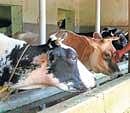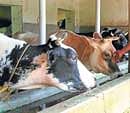

The hamlet with around 700 families is well known for its community development activities. It has made remarkable progress in terms of water literacy, dairy and cooperative sector, and is inching towards self-reliance. Most residents here don’t have a regular LPG connection at all. As many as 120 families already own biogas plants and some more are in the pipeline.
Long road to success
Idkidu is a region rich with areca gardens, coconut trees, paddy fields, cows and cow dung pits. The road to success has been a long one, for farmers here. Biogas plants made their debut two decades ago, when only a few well-to-do farmers started experimenting. Thanks to the united efforts and awareness of the villagers, now even a poor farmer with just half an acre of land and two cows has this energy saver biogas plant.
Unlike many other villages, Idkidu has three cooperative milk societies namely Amruta Dhara, Amruta Sindhu and Amruta Varshini. As many as 300 members contribute to the annual milk collection of more than eight lakh litres, and a transaction of more than a crore rupees. The dairy not only helps farmers inch towards self-reliance, but also inspires them to make use of alternate energy.
Role of the bank in development
Idkidu co-operative bank plays a crucial role in the development of the village. The bank has a clear 12-point formula to make the village self-reliant. One of their objectives is to make every house a biogas house. To support the cause, the bank has offered loans at affordable interest rates of four per cent and many farmers have benefitted. The bank fulfills the different needs of farmers including groceries, agricultural equipment and maintaining the daily accounts of farmers. The bank operates like a single window service system for all these activities. This has helped farmers a great deal in carrying out all their transactions.
It is also to the credit of residents here for making use of all the opportunities that have come their way so far, towards setting up biogas units in their homes. A few years back, the state government had announced a Rs 5,000 subsidy for biogas plant construction and at least 15-20 farmers availed of the opportunity.
There are several such instances. In 2004, Amruta Sindhu Milk Society came out with some offers on its tenth anniversary. “Ten farmers have made use of this opportunity and this has indirectly helped increase milk collection by 100 litres,” explains Padmanabha Sapalya, president of the society. A couple Vishwanath Amin and Shashikala were members of a self-help group run by the Sri Dharmasthala Rural Development Programme. They availed a loan of Rs 35,000, got a special subsidy offer for Rs 15,000, started their own dairy and biogas plant. Now they are self-reliant and happy.
Support to dairies
Biogas plants have offered indirect support to dairies in the village which were otherwise faring badly because of expensive inputs, unscientific ways of fixing milk prices and severe shortage of labour.
Biogas technology is an extension of our already existing multidimensional traditional farming system.
The methane gas in cow dung is effectively used in biogas production which otherwise would have contributed to greenhouse gas emissions. Convincing the community to take up development work is not easy. It is the united efforts of various organisations and elders of the village, apart from an effective communication system that has created a congenial atmosphere for development.
K Krishna Bhat, a veterinary doctor and the backbone of these activities says, “Dairy is our priority and biogas is a byproduct for us. We have just tried to kindle interest among the community members and this can be duplicated anywhere else too.”
To mark the silver jubilee of Amruta Dhara Milk Society this year, the villagers have set an agenda to make every member’s house a biogas house. A unique way of celebration for a unique village!